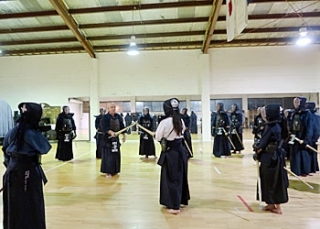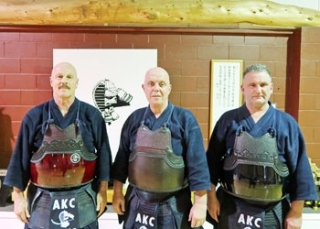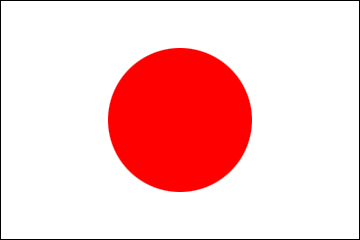Mr Graham Alan Sayer, President of Auckland Kendo Club
2017/6/8
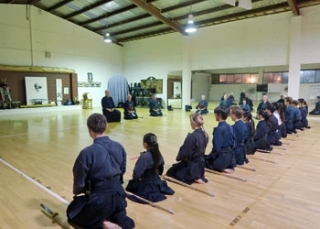
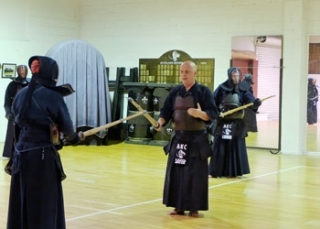
Mr Graham Alan Sayer, President of Auckland Kendo Club first took up Kendo in 1979 when he was injured while practicing Judo and was handed a bamboo sword. He attained 4th Dan grade in Japan before moving to New Zealand for the first time in 1985. At that time in New Zealand there was only a few Kendo practitioners making up 3 dojo nationwide. In 1987 Mr Sayer became President of the NZ Kendo Federation and the following year 15 representatives of New Zealand competed in the World Kendo Championships held in South Korea. In 1989 he, along with 3 other founder members established the Auckland Kendo club and he continues as the president of both organizations today.
In addition to weekly Kendo practice on Monday, Wednesday, Thursday, Saturday, and Sunday, the Auckland Kendo club also interacts with other Kendo clubs in New Zealand. Auckland kendo club members travel to Japan on a regular basis to attend international seminar held by the All Japan Kendo Federation , the Auckland Kendo Club also has close ties with the Shizuoka Kendo Federation . Between 1995 ~2007 the Auckland Kendo Club received visits and training from the late Yoshihiko Inoue Sensei (8th dan) . Graham returned to live and work in Japan from 2009 ~2015 , practicing at Inoue Sensei's dojo and after many attempts in Japan finally achieving his 7th dan in Tokyo in June 2015
Currently there are 86 members regularly training but when the club was first established it was difficult to obtain the very expensive Kendo equipment and the club received support from Kendo organisations in Japan including the Lions Club and All Japan Kendo Federation . However, through the efforts of the club’s founding members the Kendo Dojo's own building dedicated to Kendo was established in Newmarket in 1994 and the current Dojo location (Panmure) was established on a larger scale in 2008 and is continuing its activities as the largest Kendo club in New Zealand.
Mr Sayer thinks that the Auckland Kendo Club has become a more family oriented club, centered on the community, and it has classes for children and beginners. He also says that the female participation rate in Kendo is said to be around 25% but the club’s membership is 40% female. Kendo does not require a great deal of muscular strength, so women can easily participate and one of its appeals is mental growth.
With the combined efforts of a group of key dedicated Kenshi (Kendo Practitioners) a total of 10 dojo have been formed nationwide including Invercargill, Christchurch, Nelson, Wellington, Hamilton and Auckland Kendo clubs. Thanks to highly skilled NZ coaches and hard training Shiaisha (players) over the past decade NZ has improved its competitiveness at World Kendo Championships entering the top 8 in Italy in 2012 and at the recent World Kendo Championships in Tokyo (2015) reaching the top 16. Mr Sayer says that as Kendo is not a high profile Olympic sport, it is difficult to get Kendo known and gain new members. However, the four members who started the Auckland Kendo Club are still active and practice with the belief that Kendo is excellent from a character building perspective, and want to continue Kendo in this way. Mr Sayer presently holds the rank of 7th Dan, achieved in Tokyo in 2015 and is auditor for the International Kendo Federation.
(Updated) 2021/11/3
On November 3, 2021, Mr Sayer received the Order of the Rising Sun, Gold and Silver Rays for his contributions to promoting Kendo in New Zealand and furthering friendly relations between Japan and New Zealand.
In addition to weekly Kendo practice on Monday, Wednesday, Thursday, Saturday, and Sunday, the Auckland Kendo club also interacts with other Kendo clubs in New Zealand. Auckland kendo club members travel to Japan on a regular basis to attend international seminar held by the All Japan Kendo Federation , the Auckland Kendo Club also has close ties with the Shizuoka Kendo Federation . Between 1995 ~2007 the Auckland Kendo Club received visits and training from the late Yoshihiko Inoue Sensei (8th dan) . Graham returned to live and work in Japan from 2009 ~2015 , practicing at Inoue Sensei's dojo and after many attempts in Japan finally achieving his 7th dan in Tokyo in June 2015
Currently there are 86 members regularly training but when the club was first established it was difficult to obtain the very expensive Kendo equipment and the club received support from Kendo organisations in Japan including the Lions Club and All Japan Kendo Federation . However, through the efforts of the club’s founding members the Kendo Dojo's own building dedicated to Kendo was established in Newmarket in 1994 and the current Dojo location (Panmure) was established on a larger scale in 2008 and is continuing its activities as the largest Kendo club in New Zealand.
Mr Sayer thinks that the Auckland Kendo Club has become a more family oriented club, centered on the community, and it has classes for children and beginners. He also says that the female participation rate in Kendo is said to be around 25% but the club’s membership is 40% female. Kendo does not require a great deal of muscular strength, so women can easily participate and one of its appeals is mental growth.
With the combined efforts of a group of key dedicated Kenshi (Kendo Practitioners) a total of 10 dojo have been formed nationwide including Invercargill, Christchurch, Nelson, Wellington, Hamilton and Auckland Kendo clubs. Thanks to highly skilled NZ coaches and hard training Shiaisha (players) over the past decade NZ has improved its competitiveness at World Kendo Championships entering the top 8 in Italy in 2012 and at the recent World Kendo Championships in Tokyo (2015) reaching the top 16. Mr Sayer says that as Kendo is not a high profile Olympic sport, it is difficult to get Kendo known and gain new members. However, the four members who started the Auckland Kendo Club are still active and practice with the belief that Kendo is excellent from a character building perspective, and want to continue Kendo in this way. Mr Sayer presently holds the rank of 7th Dan, achieved in Tokyo in 2015 and is auditor for the International Kendo Federation.
(Updated) 2021/11/3
